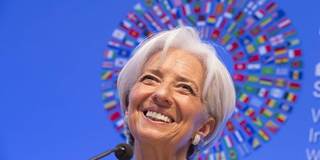The International Monetary Fund is, in many places, the organization everybody loves to hate. But fear of the IMF is not only wrong; it is dangerous for countries with troubled economies that need the Fund's resources and expertise.
CAMBRIDGE – The International Monetary Fund is, in many places, the organization that everybody loves to hate. According to some, the IMF is bad for the poor, women, economic stability, and the environment. Joseph Stiglitz, whose influence is amplified by his Nobel Prize, blames the IMF for causing and then worsening the economic crises it was called on to resolve. The IMF purportedly does so to save capitalists and bankers, not ordinary people. Though untrue, this belief does enormous harm and limits the potential good that the IMF can do.

CAMBRIDGE – The International Monetary Fund is, in many places, the organization that everybody loves to hate. According to some, the IMF is bad for the poor, women, economic stability, and the environment. Joseph Stiglitz, whose influence is amplified by his Nobel Prize, blames the IMF for causing and then worsening the economic crises it was called on to resolve. The IMF purportedly does so to save capitalists and bankers, not ordinary people. Though untrue, this belief does enormous harm and limits the potential good that the IMF can do.